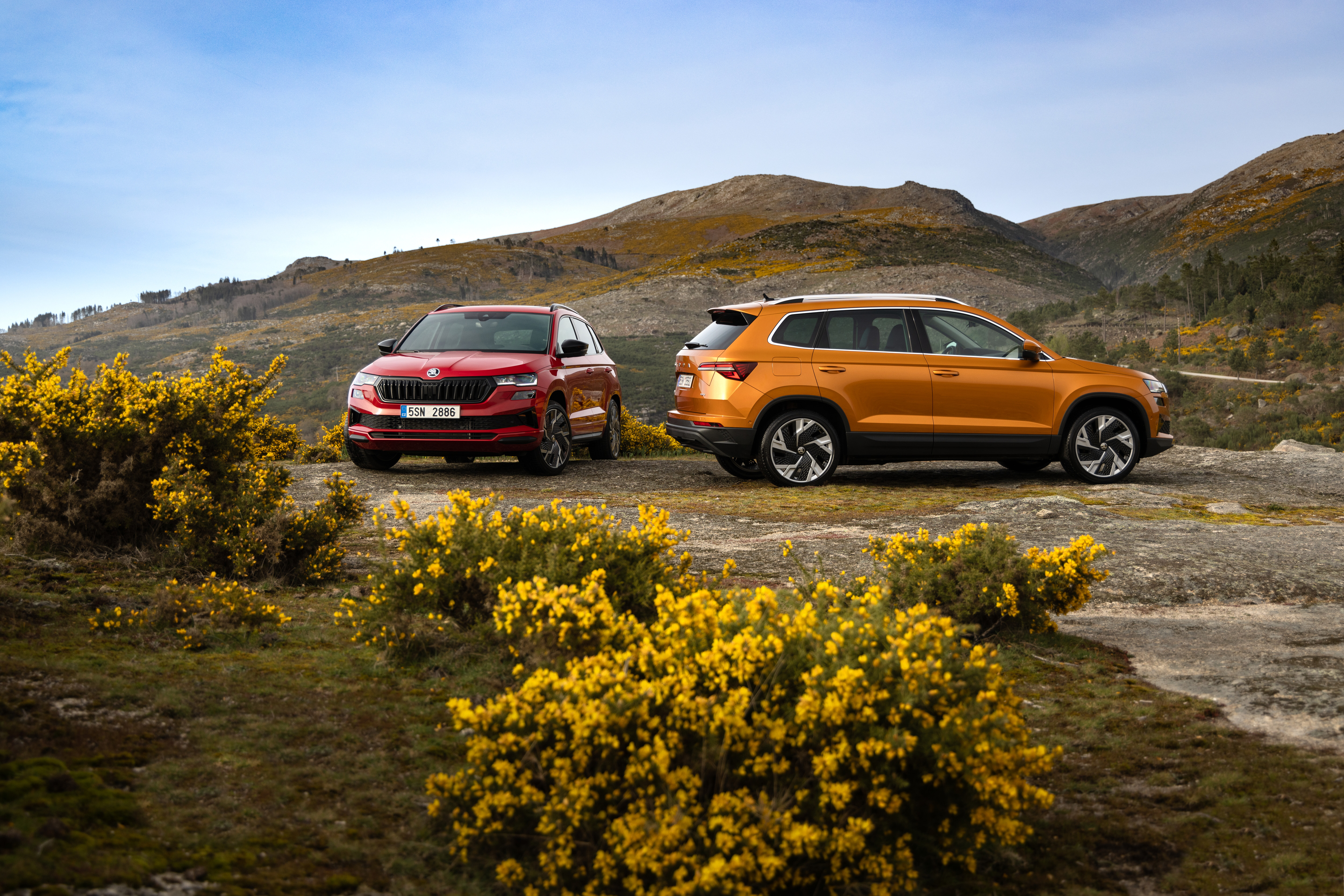› Three petrol and two diesel: power output ranging from 81 kW (110 PS) to 140 kW (190 PS)
› Top-of-the-range engine reserved for the all-wheel-drive KAROQ SPORTLINE
› Dynamic Chassis Control and progressive steering optional
Mladá Boleslav, 4 April 2022 – The engines available for the KAROQ include five advanced and efficient power units from Volkswagen Group’s latest EVO generation. The power outputs offered by the three TSI petrol engines and two diesels range from 81 kW (110 PS) to 140 kW (190 PS), with the top-level 2.0 TSI exclusively reserved for the all-wheel-drive KAROQ SPORTLINE with seven-speed DSG. All-wheel drive with an electronically controlled multi-plate clutch and seven-speed DSG are also available for the more powerful of the two diesels.
“The KAROQ’s engines are economical and efficient. High injection pressures and plasma-coated cylinder crankcases, among other things, ensure low emissions and fuel consumption in the TSI petrol engines. In the diesels, we’re using two SCR catalytic converters and a twin dosing method for particularly effective exhaust gas treatment.”
Johannes Neft, ŠKODA AUTO Board Member for Technical Development
The entry-level powertrain for the KAROQ is a three-cylinder 1.0 TSI combined with a six-speed manual gearbox. With an output of 81 kW (110 PS), this latest-generation EVO engine is particularly efficient. Low emissions are ensured by an injection pressure of up to 350 bar and an innovative, 150-μm-thin (0.15 mm) plasma-coated layer in the cylinder crankcase replacing the cast-iron cylinder liners. This reduces internal friction in the cylinders and results in better distribution and dissipation of heat in the combustion chamber, which lowers the thermal load on the engine. The four-cylinder 1.5 TSI petrol engine with an output of 110 kW (150 PS) also features Active Cylinder Technology (ACT), which further reduces fuel consumption by automatically shutting down two cylinders when engine load is low.
KAROQ SPORTLINE with 2.0 TSI and all-wheel drive as standard
The most powerful engine delivering 140 kW (190 PS) is reserved exclusively for the KAROQ SPORTLINE. The 2.0 TSI transfers its power to all four wheels via a seven-speed DSG as standard. The all-wheel-drive system makes use of a sixth-generation electronically controlled multi-plate clutch, which is roughly 0.8 kg lighter than its predecessor and more efficient. An integrated control unit enables the system to react more quickly, disengaging and re‑engaging all-wheel drive as required within fractions of a second.
Economical diesel engines with twin dosing
The two EVO diesels each have a displacement of two litres. The more powerful variant produces 110 kW (150 PS). Both units come with a six-speed manual transmission as standard; a seven-speed DSG is optional. If fitted with a DSG, the 110-kW engine transmits power to the road via all-wheel drive. The EA288 EVO engines feature an SCR system with twin dosing technology to reduce nitrogen oxide emissions. Here, AdBlue® is injected into two selective catalytic reduction converters that are arranged one after the other. One of the converters is installed in closer proximity to the engine in the exhaust gas purification module and the second is located further away from the engine in the chassis floor.
ŠKODA KAROQ engines at a glance:
| Engine | Cylinders | Power output | Transmission | Max. torque
[Nm] |
|
| [kW] | [PS] | ||||
| 1.0 TSI EVO | 3 | 81 | 110 | 6-speed M | 200 |
| 1.5 TSI EVO | 4 | 110 | 150 | 6-speed M | 250 |
| 7-speed DSG | |||||
| 2.0 TSI EVO | 4 | 140 | 190 | 7-speed DSG 4×4 | 320 |
| 2.0 TDI EVO | 4 | 85 | 116 | 6-speed M | 300 |
| 7-speed DSG | 250 | ||||
| 2.0 TDI EVO | 4 | 110 | 150 | 6-speed M | 340 |
| 7-speed DSG 4×4 | 360 | ||||
Dynamic Chassis Control and progressive steering optional
The Ambition and Style trim levels, as well as the SPORTLINE variant, can be equipped with Dynamic Chassis Control (DCC) and progressive steering as an option. DCC continuously assesses the driving situation and adjusts damping and steering accordingly. The basic settings – Eco, Comfort, Normal and Sport – can be chosen in Driving Mode Select, while in the Individual mode, these can be fine-tuned. Progressive steering features a variable steering ratio. This depends on the steering angle and enables better handling at higher speeds and greater agility in corners. At the same time, the steering forces are significantly lower at larger steering angles, for example when turning at low speeds in the city or when parking, making the vehicle easier to manoeuvre.

Christian Heubner
Head of Product Communications
T +420 730 862 420
christian.heubner@skoda-auto.cz
Zdeněk Štěpánek
Spokesperson – Product Communications
T +420 730 861 579
zdenek.stepanek3@skoda-auto.cz

























